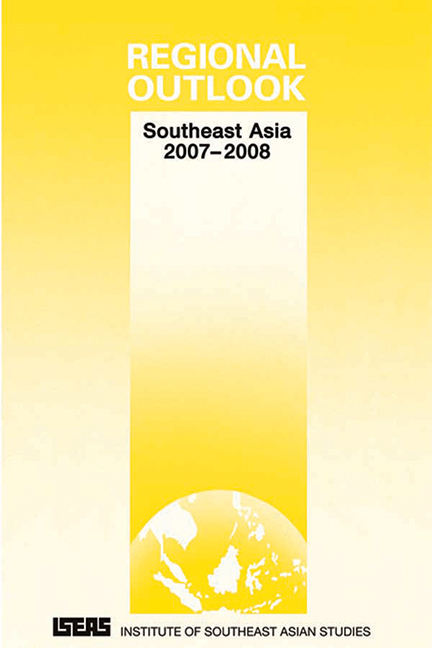Preface
Published online by Cambridge University Press: 21 October 2015
Summary
Since 1992, the Institute of Southeast Asian Studies has been offering a concise analysis of the political and economic trends in ASEAN and the wider region through its annual Regional Outlook. Written in an accessible and easily understood scholarly style, this publication is suited for a modern audience of busy executives, professionals, diplomats, journalists, and interested observers. Regional Outlook, over the years, has managed to build up a loyal readership within Southeast Asia and beyond.
In 2005, Regional Outlook alerted readers that security threats remained a constant. The outbreaks of terrorism and violence in Indonesia, southern Thailand, and southern Philippines demonstrated that such threats remained a preoccupation, besides non-traditional security problems such as the bird flu, piracy, the haze caused by the burning of forests, and environmental and natural disasters. The haze has motivated regional cooperation, in order to prevent a worse outbreak in 2007, when the predicted El Niño effects might worsen the impacts on health, tourism, and investments.
On the positive achievements list are the major steps taken to strengthen Asian regional cooperation, such as the holding of the East Asia Summit (EAS) in Kuala Lumpur in December 2005. The major significance of the EAS was the expansion of the geographic footprint to include India, Australia, and New Zealand. The inclusion of all the major Asian powers shows that the EAS is both inclusive as well as serious. Already the list of interested external powers wanting admission is growing. The challenge is now to articulate the vision and the roadmap, the instruments, and the norms needed to transform the EAS beyond a talk-shop towards an Asian community. On the negative side, the challenges to the Asian region posed by the North Korean nuclear test are numerous and daunting. Beyond getting Pyongyang back to the negotiating table at the Six Party Talks lies the challenge of starting serious negotiations between the United States and North Korea.
- Type
- Chapter
- Information
- Regional OutlookSoutheast Asia 2007-2008, pp. vii - xPublisher: ISEAS–Yusof Ishak InstitutePrint publication year: 2007

